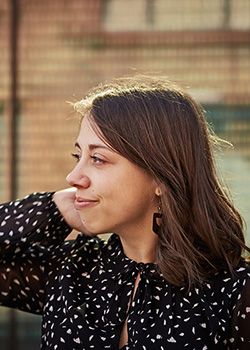Follow My Lead: Maggie Deptola
As told to Kylie Gray
January 24, 2019
BA International Area Studies ’13
Chief Operating Officer, Coded by Kids
A drive to address economic inequalities — and a less-than- engaging high school experience — led Maggie Deptola to Coded by Kids, a local nonprofit that aspires to make technology education accessible to all middle and high school students. Her work caught the eye of professional networking giant LinkedIn, which featured Deptola in its #InItTogether campaign. Her likeness has since been featured on billboards throughout Philadelphia and even in a commercial that aired during the 2018 Winter Olympics — a fitting nod to her Olympian determination to transform education.
I grew up going to public school in Pittsburgh. My parents spent their whole lives in public service. They raised me with the “radical” notion that everyone deserves the same opportunities.
In high school, I went from being a straight-A student to a frequent underachiever. A lot of it was because I was disengaged. I was at the top of my class sophomore year, and then I had 60 absences in my junior year. I was bored out of my mind. So many kids are bored. I had every opportunity growing up middle class, but I never found that thing in the K-12 setting to keep me interested and make me feel that I was working toward something.
Number of Vacation Days I Took Last Year:
4 weeks. Vacation is important!
My Favorite Podcast for Professional Development:
“How I Built This with Guy Raz”
How I Recharge:
Camping sans technology for a week or two
A lot of the work I do now is aimed at addressing that: How do you design engaging programs for students to explore opportunities they may not come across in a normal school day? How do you give high school students more information to make better decisions when they graduate?
More than anything, Drexel taught me what kind of learner I am. Co-op clicked for me — I found I needed things to be hands-on to engage. It helped me be savvier with my time and select courses that would be relevant and interesting.
My last co-op was in resource planning at the Philadelphia Water Department, and I was hired as a consultant there after graduation. I was doing a lot of writing and research for these huge annual reports. They documented the progress of hundreds of projects in a $2 billion infrastructure program for the state and U.S. Environmental Protection Agency. We needed a system to make writing the reports easier.
That’s how I started learning about database design and management. For a while, I was basically a professional nag, asking for project updates and overseeing an elaborate system of spreadsheets. Then I got plugged into coding meetups, and that was my entry point into tech.
I liked working with data, so I left the city job and jumped into a tech startup. The trial-by-fire startup pace was excellent preparation for what came next, when I connected with Sylvester Mobley, the founder and CEO of Coded by Kids.
I knew Mobley through colleagues at the Water Department. He was ready to scale the organization, but he needed a team to take his idea to the next level.

Technology is a field that is changing rapidly. A programming language can go in and out of relevance in two years, and there is no “magic bullet” webinar to get teachers up to speed. We wanted to show that we can set the bar higher by bringing in industry mentors as teachers, and structuring curricula around the demands of the industry.
When I started working for Coded as an operations manager three years ago, we had programs in one recreation center and maybe three schools. Now, we have 35 program partnerships in Philadelphia, New Jersey and Delaware, many of which I’ve facilitated.
There are so many other locations nationally that are interested in our work — but we have to jump on opportunities when they make sense for the business. We grew a little too quickly in the past because there was so much enthusiasm for our programs.
Working at a startup, I’ve learned to be comfortable with uncertainty. There were times in the beginning when friends questioned my path, but I saw the impact that we were having on students, and that I was part of it. Even the difficult times at Coded have made me feel that I’m becoming a better employee and a better leader.
When I became a manager, I had so many ideas about how I would manage differently than others had managed me. But now I can see the other side. Not many people are trained in leadership, and it is hard to be consistently under a microscope. Your staff feeds off your energy.
As a manager, I’ve learned to accept a certain amount of failure. My role is to help build procedures to minimize miscommunications. But there will always be messes to clean up. We are trained from kindergarten to associate failure with negativity. In reality, it is a necessary part of learning and growing.
I’ve stayed in education because I believe in what it can accomplish. The problems our society is facing are systemic. And the decisions we make about what students learn drive many of those systemic failures.
The kids who do well in our classes are not always the math and science kids. They are the artists and musicians — the ones who know that they will need to establish an online presence. Students can build projects that are thoughtful, creative and complex with the right support and motivation.
There is a whole world of technology out there connected to everything students do. We want more kids to understand, with real-world context, that technology is something they can pursue.
* This article originally appeared in the College of Arts and Sciences' Ask magazine feature story, “Follow my Lead.” For more Ask stories, visit askmagazine.org.